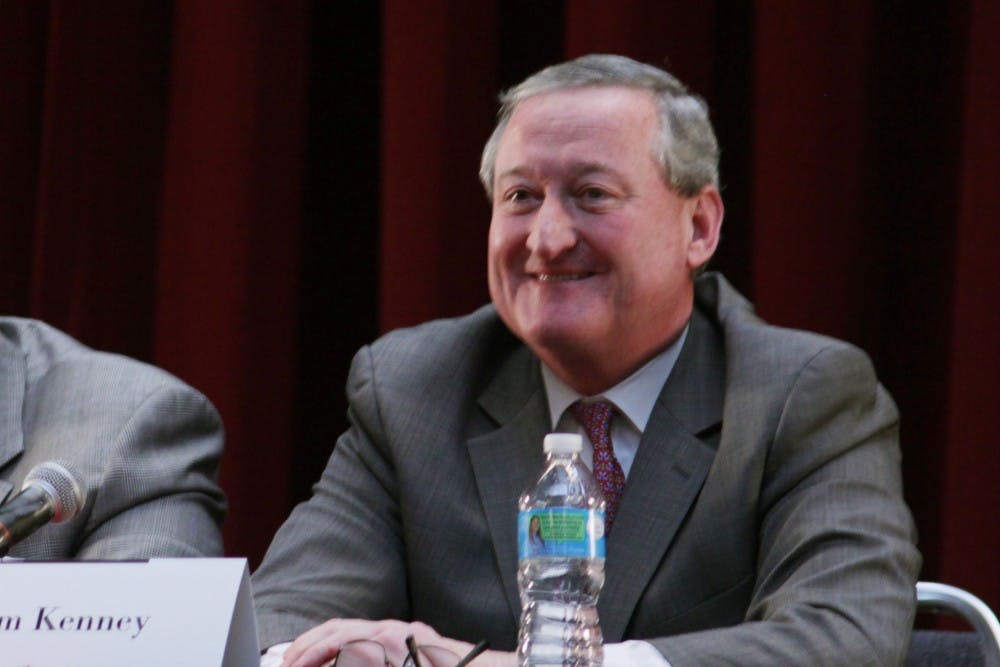It may still be six months until Philadelphia’s general election for mayor, but it looks like the city already has its new chief executive.
Former City Councilman Jim Kenney won the Philadelphia Democratic primary for mayor last Tuesday with 55.83 percent of the vote. The former professor at the Fels Institute of Government overwhelmingly defeated the other five candidates by amassing a coalition of progressive voters that crossed racial lines.
State Sen. Anthony H. Williams came in second with 26.11 percent of the votes, followed by former District Attorney Lynne Abraham, former Philadelphia Gas Works senior vice president Doug Oliver, former City Solicitor Nelson Diaz and former state Sen. Milton Street — whose voting percentages were all in the single digits.
Kenney will face off against Republican candidate Melissa Murray Bailey in the Nov. 3 general election. However, experts expect an easy win for Kenney due to his challenger’s political inexperience and the city’s overwhelming Democratic electorate. Not to mention the fact that Philadelphia hasn’t seen a Republican mayor in the last six decades.
In the election for City Council, 1986 College graduate W. Wilson Goode lost his reelection campaign, while 1993 College graduate Helen Gym finished well enough in the primary to all but guarantee her a seat on Council in November. Gym is a famous supporter of public education in the city.
1975 College graduate Sherrie Cohen lost her second bid for City Council, narrowly trailing Gym in the primary results.
1978 College graduate and Republican Ward Leader Matt Wolfe lost his campaign for an at-large seat to the City Council. Republicans are generally guaranteed two seats on the Council per a city ordinance reserving two spots for members of the minority party.
The issue that dominated both the mayoral and Council races was education.
In recent years the local education system has been plagued by budgetary deficits and countless school closings.
“In terms of public education, Kenney has been very clear, and the support that he has gotten from the teachers union suggests so, that it is something he’ll respect. He thinks that public education has to be a top priority,” local politics expert and St. Joseph’s University professor Randall Miller said.
If Kenney takes office, the debate over Payments in Lieu of Taxes, or PILOTs, will likely resurface given Kenney’s commitment to finding new sources of revenues for the education system.
PILOTs are voluntary contributions that nonprofit organizations make to finance essential services like trash collection, police and fire protection.
A great part of the local school funding relies on revenues from property taxes, which Penn and other nonprofits are exempt from paying under Pennsylvania law. A PILOT program would help the debt-ridden school district, supporters say.
From 1995 to 2000, Penn had an agreement under which the university paid an estimated $9 million in PILOTs. The University has not participated in a PILOTs program since then.
This year, Penn has received pressure from activists, students and local officials to provide PILOTs.
“For a university with Penn’s wealth, and that is supposed to educate people to serve the public, paying PILOTs would be completely in line with Penn’s mission,” Penn Democrats President and College senior Sean Foley said.
The current mayor, Michael Nutter, hasn’t shown active support for a PILOT program. In March he told The Philadelphia Inquirer that he doesn’t “think a PILOT program here, or demonstrated in any other city, is the kind of sustainable, long-term, serious funding that our school system needs.”
The University stated that its economic and social contributions to the city alleviate the loss in taxes due to Penn’s nonprofit status.
In particular, Penn cites its $800,000 annual subsidy to the Penn Alexander School, its partnership with local schools through the Netter Center for Community Partnerships and the thousands of jobs it creates as the city’s largest private employer.
Unlike the incumbent mayor, Kenney has explicitly stated his support for a more rigorous citywide PILOTs program.
In his online platform for education Kenney draws on Boston’s successful “PILOT Task Force”, which helped the Massachusetts city receive $23 million through PILOTs in 2013. This amount overwhelmingly surpasses Philadelphia’s collection of about $500,000 through PILOTs in 2011.
His platform states that due to Philadelphia’s larger city size Kenney, “is committed to at least collecting as much in PILOTs ... as Boston does currently.”
The City Council seems to be on the same page as Kenney. On March 26, the Council passed a resolution asking Nutter to issue an executive order requesting tax-exempt nonprofit organizations to make voluntary payments to help fund city schools.
Miller thinks that Kenney, a 23 year veteran of the City Council, will have a good working relationship with the city’s legislators.
“Together they will come up with some type of funding proposal. They’re not going to solve the public school problem. But they can do a lot in the short term, instead of having this constant bickering and battering that we’ve seen over the last years,” he said.
If Kenney takes office next year, his promised support for a PILOT program, along with City Council’s existing efforts to address the local education system could align cohesively. Come January, Penn might be facing more pressure for PILOTs than it currently does from the local Philadelphia government.



